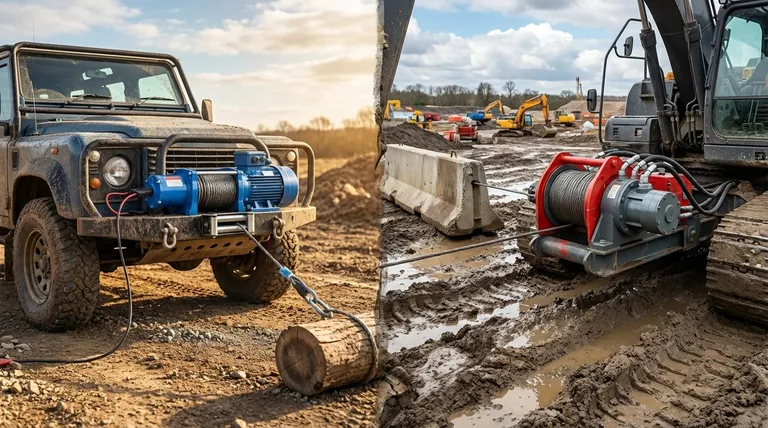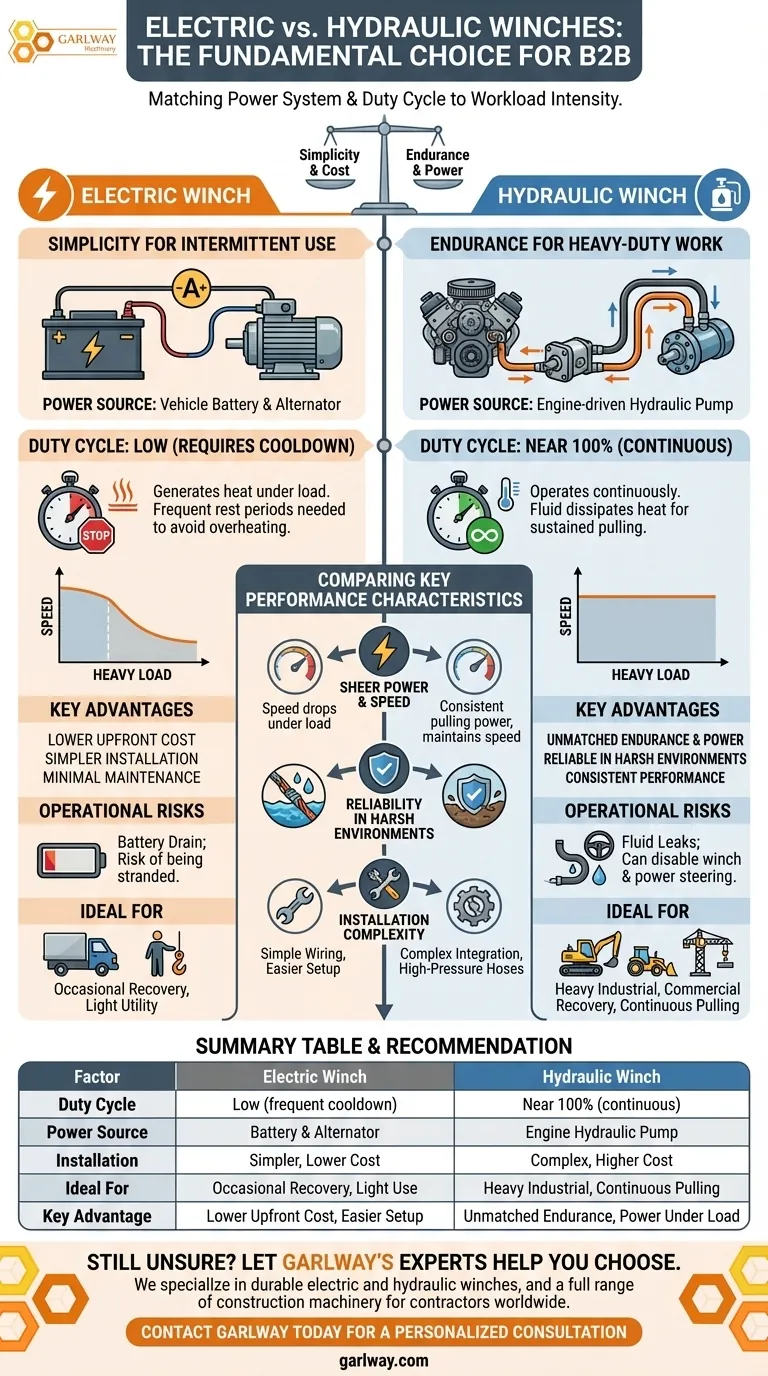The fundamental choice between an electric and hydraulic winch comes down to your vehicle's power system and how intensely you plan to use the winch. The key factors to weigh are the required duty cycle, the available power source, the operating environment, and the complexity of installation and maintenance. Electric winches are simpler and sufficient for most intermittent use, while hydraulic winches are built for sustained, heavy-duty work.
The core trade-off is simplicity versus endurance. Electric winches offer straightforward installation and operation for occasional tasks, while hydraulic winches deliver relentless power for continuous, demanding jobs at the cost of higher complexity and maintenance.

The Fundamental Difference: Power and Duty Cycle
The primary distinction between these two winch types is how they generate force and how long they can operate without interruption. This is determined entirely by their power source.
How Electric Winches Work
An electric winch connects directly to your vehicle's electrical system. It draws a significant amount of amperage from the battery and alternator to power its electric motor.
This design makes it relatively easy to install. However, it also means the winch's performance is limited by the vehicle's electrical output and the motor's ability to dissipate heat.
How Hydraulic Winches Work
A hydraulic winch taps into the vehicle's power steering pump or a dedicated hydraulic pump run by the engine. It uses pressurized hydraulic fluid to drive a hydraulic motor.
Because it runs off the engine's power, it can operate continuously without draining the battery or overheating, as long as the vehicle's engine is running.
Defining "Duty Cycle"
Duty cycle is the single most important concept in this comparison. It refers to the amount of time a winch can operate under load before it needs to cool down.
Electric winches have a low duty cycle. Pulling a heavy load generates immense heat in the electric motor, requiring frequent rest periods. Exceeding this limit can cause permanent damage.
Hydraulic winches have a near-100% duty cycle. The hydraulic fluid helps dissipate heat, allowing them to run continuously for long periods without risk of overheating.
Comparing Key Performance Characteristics
Beyond duty cycle, the power source dictates significant differences in power delivery, durability, and installation.
Sheer Power and Speed
Hydraulic winches typically deliver more consistent pulling power and maintain their line speed even under heavy loads.
Electric winches are very capable, but their speed often drops noticeably as the load increases. They work hardest—and generate the most heat—when nearing their maximum capacity.
Reliability in Harsh Environments
For operators working in extremely wet, muddy, or dusty conditions, hydraulic systems often have an edge.
Their components are generally sealed and designed to withstand the rigors of industrial use, making them less susceptible to damage from water and contaminants than the electrical components of a winch.
Installation Complexity
Electric winches are significantly easier and cheaper to install. The process primarily involves mounting the winch and running heavy-gauge wires to the vehicle's battery.
Installing a hydraulic winch is a more involved mechanical job. It requires tapping into the vehicle’s power steering system or adding a separate pump, which involves routing high-pressure hydraulic hoses.
Understanding the Trade-offs and Pitfalls
The right choice depends on a clear-eyed assessment of cost, maintenance commitments, and operational realities.
Upfront vs. Long-Term Costs
Electric winches have a much lower upfront cost, making them the accessible choice for recreational and light commercial users.
Hydraulic winches and their required installation kits are considerably more expensive. Their value is realized in commercial applications where downtime is costly and performance is critical.
Maintenance Demands
An electric winch requires minimal maintenance, primarily ensuring electrical connections are clean and tight and inspecting the wire or synthetic rope.
A hydraulic system demands more attention. You must regularly inspect hoses, fittings, and seals for leaks and ensure the hydraulic fluid is clean and at the proper level to prevent system failure.
Operational Risks
With an electric winch, the primary risk is draining the vehicle's battery during a long recovery, potentially leaving you stranded. Always keep the engine running at a high idle when winching.
With a hydraulic winch, the main risk is a hydraulic fluid leak, which can disable both the winch and the vehicle's power steering. This makes routine inspection absolutely critical.
Making the Right Choice for Your Application
Your decision should be driven by a realistic assessment of your most common and most demanding use cases.
- If your primary focus is occasional vehicle recovery or utility use: An electric winch is the most practical and cost-effective choice due to its simple installation and lower initial investment.
- If your primary focus is heavy industrial work, commercial recovery, or continuous pulling: A hydraulic winch is the superior tool, offering unmatched power and a virtually unlimited duty cycle.
- If you operate constantly in extremely wet or muddy environments: The inherently sealed nature of a hydraulic system provides a significant advantage in long-term durability and reliability.
Ultimately, choosing the right winch is about matching the tool's core design to the true demands of your workload.
Summary Table:
| Factor | Electric Winch | Hydraulic Winch |
|---|---|---|
| Duty Cycle | Low (requires frequent cooldown) | Near 100% (continuous operation) |
| Power Source | Vehicle Battery & Alternator | Engine-driven Hydraulic Pump |
| Installation | Simpler, lower cost | Complex, requires hydraulic system integration |
| Ideal For | Occasional recovery, light use | Heavy industrial, continuous pulling |
| Key Advantage | Lower upfront cost, easier setup | Unmatched endurance, power under load |
Still unsure which winch is right for your specific vehicle and job requirements?
Let GARLWAY's experts help you make the right choice. We specialize in providing durable and powerful construction machinery, including a full range of electric and hydraulic winches, concrete mixers, and batching plants for construction companies and contractors worldwide.
We can help you assess your needs based on your vehicle's power system, typical workload, and operating environment to ensure you get a winch that delivers reliable performance.
Contact GARLWAY today for a personalized consultation and discover how our robust solutions can enhance your operational efficiency and safety.
Visual Guide

Related Products
- Electric and Hydraulic Winch for Heavy Duty Applications
- Electric 120V Boat Winch by Badlands
- 12000 lb Heavy Duty Electric Boat Winch
- Electric Hoist Winch Boat Anchor Windlass for Marine Applications
- Heavy Duty Electric Boat Winch Windlass Anchor
People Also Ask
- What are the long-term advantages of having a winch on a trailer? Protect Your Investment & Enhance Safety
- What are the health warnings associated with windlasses? Prioritize Operational Safety
- How do advanced electric winches differ from basic ones? Unlock Intelligent Control & Safety
- What is a marine load out and how are winches used in this process? | Essential Guide for Heavy Transport
- What are the applications of electric winches in the marine industry? Powering Anchoring, Mooring, and Towing
- What safety measures should be taken when operating a winch? A Guide to Risk-Free Heavy Lifting
- What type of braking system does the JK quick winch use? Reliable Electromagnetic Braking for Safe Lifting
- What are important considerations for chain locker configuration? Avoid Tangles and Jams for Safe Anchoring



















